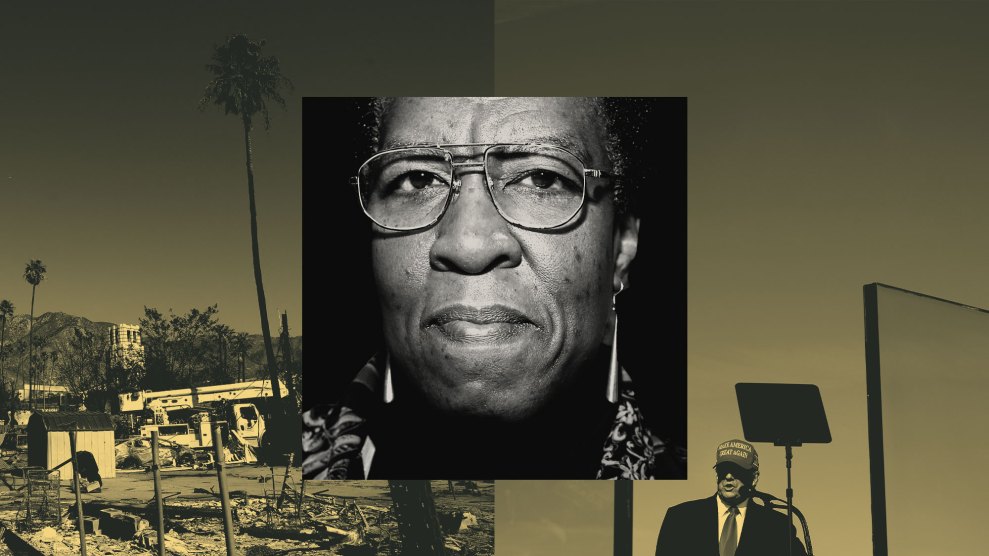Dear Mother Jones reader,
Hi, it’s me, Paula Poundstone. In the last issue I promised that I would go places, learn things, and tell them to you if you asked me or if it seemed necessary.
In the late summer I booked a date to work at the Wheeler Opera House in Aspen, Colorado. As the 1992 elections neared I was vaguely aware that some kind of organized homophobia was surfacing in both Oregon and Colorado.
I’m not proud of this, but I was cheating off of other people’s sample ballots and cramming at the last minute just to figure out my California ballot. I certainly didn’t have time to decode Oregon’s and Colorado’s ballots as well.
Then Colorado passed its anti-gay Amendment 2.
I asked my agent, Dave Snyder, if I should boycott the state by canceling my date in Aspen. He thought it would be better to go and make a statement. After all, I’m not Barbra Streisand. For me to back out of a night’s performance would not likely bring Colorado’s economy to its knees.
Dave also told me that he had a client who was cancelling a job there because he wanted a night off anyways, but that the guy was going to pass it off as part of the boycott. Then the mayor of Atlanta decided to conduct no official business in Colorado, forgetting, I guess, that sodomy is illegal in Georgia. A lot of well-meaning celebrities chose to vacation in Utah in order to honor the boycott. Utah? That’s like letting “Son of Sam” go to make room for Jeffrey Dahmer. I saw Madonna’s name on a list of boycotters. Lucky ducks. That could backfire.
Readers, are you playing along on the home version of the game? Not such an easy call, huh? I finally decided to do my job in Aspen, take all the money I would make there and put up anti-Amendment 2 billboards throughout Colorado Springs, the city of its birth.
I faxed an advertising company the copy for fifteen billboards like the one in the picture on this page.
The ad guy called back and said that the most effective billboards have less than nine words and a picture. I was tempted to change all of mine until I remembered that the most effective billboards have a picture of spaghetti with Jesus’ face in it or a large-breasted, blonde woman selling beer.
Before I went to work in Aspen, Mother Jones sent me to Colorado Springs. I think I thought I’d find the source of the problem, like lead paint or something.
The amendment was spearheaded by a religious right group called Colorado for Family Values. The group ran a seamless campaign of distortions that played easily on people’s fears and ignorance about homosexuality. Their most effective refrain was that homosexuals wanted “special” rights because of the way they had sex.
The group’s chairman is a car salesman named Will Perkins who includes religious rhetoric in his personalized television commercial pitches to come on down to his lot for his dealin’est days. I met with him at Perkins Chrysler-Plymouth.
Will confessed to me, as he had in more than one interview, that in high school he didn’t even like girls and he’s almost certain now that if he had had a homosexual counselor or teacher at that time they may have convinced him to join their side. I am confused by what the root causes of heterosexuality or homosexuality may be, but Will Perkins admits to no uncertainty. He is sure that sexual orientation is determined in the tenth grade in sort of a grand-scale game of “Red Rover, Red Rover.”
I’d make a lousy investigative reporter. It was hard for me not to call Will Perkins a big butterhead and run down the stairs crying. I wondered if he could see the vein in my neck sticking out. I wondered if the vein in Sam Donaldson’s neck ever stuck out.
Will said he takes great offense when people accuse him of hating gays. Why, he was almost gay himself once. And discrimination? “I know what it’s like to be discriminated against,” he said. “I’m a car salesman. People make fun of the plaid we wear and our white shoes.” For a moment I actually thought, “Ya, that must be awful,” then I remembered he could always do another job.
Of course he’s not likely to change jobs because he seems to be a very good car salesman. I asked him if he really believed that the 53 percent of voters who’d supported Amendment 2 felt in their hearts the way he did, or if he’d blurred the issue so much that he’d tricked people into voting the way he wanted. He said, “You don’t think Clinton blurred some issues?”
















